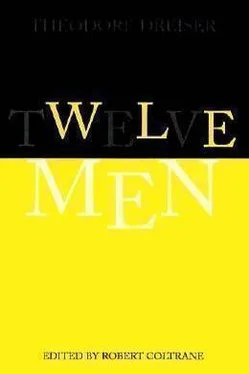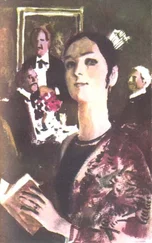Теодор Драйзер - Twelve Men
Здесь есть возможность читать онлайн «Теодор Драйзер - Twelve Men» весь текст электронной книги совершенно бесплатно (целиком полную версию без сокращений). В некоторых случаях можно слушать аудио, скачать через торрент в формате fb2 и присутствует краткое содержание. Год выпуска: 2014, Издательство: epubBooks Classics, Жанр: Биографии и Мемуары, на английском языке. Описание произведения, (предисловие) а так же отзывы посетителей доступны на портале библиотеки ЛибКат.
- Название:Twelve Men
- Автор:
- Издательство:epubBooks Classics
- Жанр:
- Год:2014
- ISBN:нет данных
- Рейтинг книги:4 / 5. Голосов: 1
-
Избранное:Добавить в избранное
- Отзывы:
-
Ваша оценка:
- 80
- 1
- 2
- 3
- 4
- 5
Twelve Men: краткое содержание, описание и аннотация
Предлагаем к чтению аннотацию, описание, краткое содержание или предисловие (зависит от того, что написал сам автор книги «Twelve Men»). Если вы не нашли необходимую информацию о книге — напишите в комментариях, мы постараемся отыскать её.
Twelve Men — читать онлайн бесплатно полную книгу (весь текст) целиком
Ниже представлен текст книги, разбитый по страницам. Система сохранения места последней прочитанной страницы, позволяет с удобством читать онлайн бесплатно книгу «Twelve Men», без необходимости каждый раз заново искать на чём Вы остановились. Поставьте закладку, и сможете в любой момент перейти на страницу, на которой закончили чтение.
Интервал:
Закладка:
"What do you suppose would make a good song these days?" he asked in an idle, meditative mood, sitting at the piano and thrumming while I at a nearby table was looking over my papers. "Why don't you give me an idea for one once in a while, sport? You ought to be able to suggest something."
"Me?" I queried, almost contemptuously, I suppose. I could be very lofty at times in regard to his work, much as I admired him—vain and yet more or less dependent snip that I was. "I can't write those things. Why don't you write something about a State or a river? Look at 'My Old Kentucky Home,' 'Dixie,' 'Old Black Joe'—why don't you do something like that, something that suggests a part of America? People like that. Take Indiana—what's the matter with it—the Wabash River? It's as good as any other river, and you were 'raised' beside it."
I have to smile even now as I recall the apparent zest or feeling with which all at once he seized on this. It seemed to appeal to him immensely. "That's not a bad idea," he agreed, "but how would you go about it? Why don't you write the words and let me put the music to them? We'll do it together!"
"But I can't," I replied. "I don't know how to do those things. You write it. I'll help—maybe."
After a little urging—I think the fineness of the morning had as much to do with it as anything—I took a piece of paper and after meditating a while scribbled in the most tentative manner imaginable the first verse and chorus of that song almost as it was published. I think one or two lines were too long or didn't rhyme, but eventually either he or I hammered them into shape, but before that I rather shamefacedly turned them over to him, for somehow I was convinced that this work was not for me and that I was rather loftily and cynically attempting what my good brother would do in all faith and feeling.
He read it, insisted that it was fine and that I should do a second verse, something with a story in it, a girl perhaps—a task which I solemnly rejected.
"No, you put it in. It's yours. I'm through."
Some time later, disagreeing with the firm as to the conduct of the magazine, I left—really was forced out—which raised a little feeling on my part; not on his, I am sure, for I was very difficult to deal with.
Time passed and I heard nothing. I had been able to succeed in a somewhat different realm, that of the magazine contributor, and although I thought a great deal of my brother I paid very little attention to him or his affairs, being much more concerned with my own. One spring night, however, the following year, as I was lying in my bed trying to sleep, I heard a quartette of boys in the distance approaching along the street in which I had my room. I could not make out the words at first but the melody at once attracted my attention. It was plaintive and compelling. I listened, attracted, satisfied that it was some new popular success that had "caught on." As they drew near my window I heard the words "On the Banks of the Wabash" most mellifluously harmonized.
I jumped up. They were my words! It was Paul's song! He had another "hit" then—"On the Banks of the Wabash," and they were singing it in the streets already! I leaned out of the window and listened as they approached and passed on, their arms about each other's shoulders, the whole song being sung in the still street, as it were, for my benefit. The night was so warm, delicious. A full moon was overhead. I was young, lonely, wistful. It brought back so much of my already spent youth that I was ready to cry—for joy principally. In three more months it was everywhere, in the papers, on the stage, on the street–organs, played by orchestras, bands, whistled and sung in the streets. One day on Broadway near the Marlborough I met my brother, gold–headed cane, silk shirt, a smart summer suit, a gay straw hat.
"Ah," I said, rather sarcastically, for I still felt peeved that he had shown so little interest in my affairs at the time I was leaving. "On the banks, I see."
"On the banks," he replied cordially. "You turned the trick for me, Thee, that time. What are you doing now? Why don't you ever come and see me? I'm still your brother, you know. A part of that is really yours."
"Cut that!" I replied most savagely. "I couldn't write a song like that in a million years. You know I couldn't. The words are nothing."
"Oh, all right. It's true, though, you know. Where do you keep yourself? Why don't you come and see me? Why be down on me? I live here, you know." He looked up at the then brisk and successful hotel.
"Well, maybe I will some time," I said distantly, but with no particular desire to mend matters, and we parted.
There was, however, several years later, a sequel to all this and one so characteristic of him that it has always remained in my mind as one of the really beautiful things of life, and I might as well tell it here and now. About five years later I had become so disappointed in connection with my work and the unfriendly pressure of life that I had suffered what subsequently appeared to have been a purely psychic breakdown or relapse, not physical, but one which left me in no mood or condition to go on with my work, or any work indeed in any form. Hope had disappeared in a sad haze. I could apparently succeed in nothing, do nothing mentally that was worth while. At the same time I had all but retired from the world, living on less and less until finally I had descended into those depths where I was in the grip of actual want, with no place to which my pride would let me turn. I had always been too vain and self–centered. Apparently there was but one door, and I was very close to it. To match my purse I had retired to a still sorrier neighborhood in B―, one of the poorest. I desired most of all to be let alone, to be to myself. Still I could not be, for occasionally I met people, and certain prospects and necessities drove me to various publishing houses. One day as I was walking in some street near Broadway (not on it) in New York, I ran into my brother quite by accident, he as prosperous and comfortable as ever. I think I resented him more than ever. He was of course astonished, shocked, as I could plainly see, by my appearance and desire not to be seen. He demanded to know where I was living, wanted me to come then and there and stay with him, wanted me to tell him what the trouble was—all of which I rather stubbornly refused to do and finally got away—not however without giving him my address, though with the caution that I wanted nothing.
The next morning he was there bright and early in a cab. He was the most vehement, the most tender, the most disturbed creature I have ever seen. He was like a distrait mother with a sick child more than anything else.
"For God's sake," he commented when he saw me, "living in a place like this—and at this number, too!" (130 it was, and he was superstitious as to the thirteen.) "I knew there'd be a damned thirteen in it!" he ejaculated. "And me over in New York! Jesus Christ! And you sick and run down this way! I might have known. It's just like you. I haven't heard a thing about you in I don't know when. Well, I'm not going back without you, that's all. You've got to come with me now, see? Get your clothes, that's all. The cabby'll take your trunk. I know just the place for you, and you're going there tomorrow or next day or next week, but you're coming with me now. My God, I should think you'd be ashamed of yourself, and me feeling the way I do about you!" His eyes all but brimmed.
I was so morose and despondent that, grateful as I felt, I could scarcely take his mood at its value. I resented it, resented myself, my state, life.
"I can't," I said finally, or so I thought. "I won't. I don't need your help. You don't owe me anything. You've done enough already."
"Owe, hell!" he retorted. "Who's talking about 'owe'? And you my brother—my own flesh and blood! Why, Thee, for that matter, I owe you half of 'On the Banks,' and you know it. You can't go on living like this. You're sick and discouraged. You can't fool me. Why, Thee, you're a big man. You've just got to come out of this! Damn it—don't you see—don't make me"—and he took out his handkerchief and wiped his eyes. "You can't help yourself now, but you can later, don't you see? Come on. Get your things. I'd never forgive myself if I didn't. You've got to come, that's all. I won't go without you," and he began looking about for my bag and trunk.
Читать дальшеИнтервал:
Закладка:
Похожие книги на «Twelve Men»
Представляем Вашему вниманию похожие книги на «Twelve Men» списком для выбора. Мы отобрали схожую по названию и смыслу литературу в надежде предоставить читателям больше вариантов отыскать новые, интересные, ещё непрочитанные произведения.
Обсуждение, отзывы о книге «Twelve Men» и просто собственные мнения читателей. Оставьте ваши комментарии, напишите, что Вы думаете о произведении, его смысле или главных героях. Укажите что конкретно понравилось, а что нет, и почему Вы так считаете.









